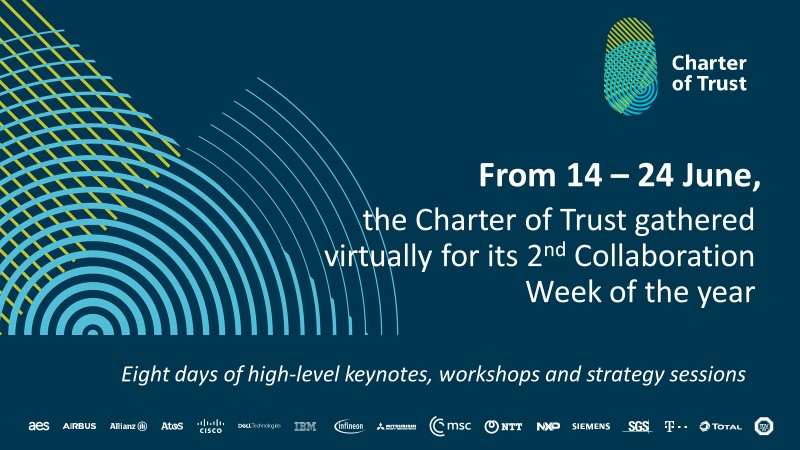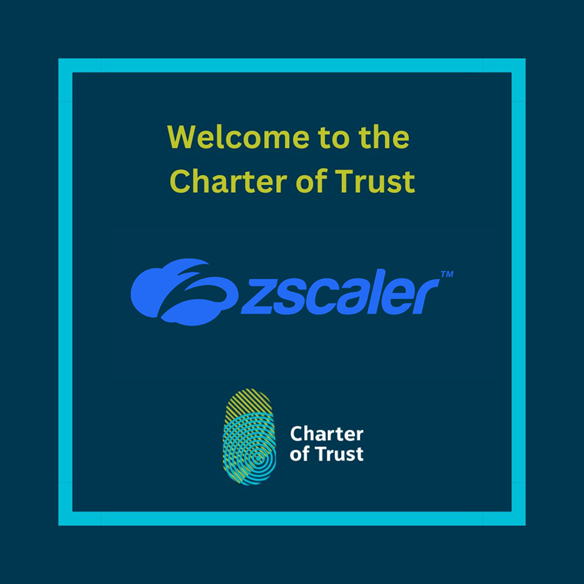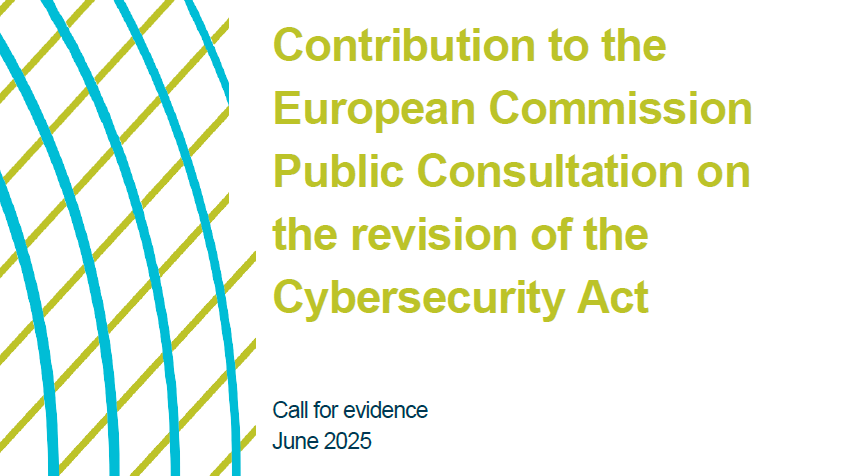Between 14 and 24 June, representatives from Partner companies around the world gathered virtually for the Charter of Trust’s second Collaboration Week of the year. Principle Taskforces came together with the aim of further building up the strategic priorities of the Charter of Trust. The Charter of Trust also had the opportunity to welcome global cybersecurity experts, whose vibrant and insightful presentations fed into the overall discussion.

Public and private organisations around the globe are increasingly witnessing a sharp rise in cyberattacks, even more so since the beginning of the pandemic. The recent Kaseya ransomware supply-chain attack highlights once again the need to increase cybersecurity efforts across all sectors. Collaboration and knowledge exchange are key pathways for the industry and other organisations to share best practices and collectively raise resilience against a growing and complex threat landscape.
Over the course of two weeks that were filled with working sessions and discussions , Charter of Trust Partners met in taskforces each dedicated to one of the 10 Principles. The Principle Taskforces that were active during this Collaboration Week included: Principle 2 “Responsibility throughout the digital supply chain”, Principle 3 “Security by default”, Principle 6 “Education”, Principle 7 “Certification for critical infrastructure and solutions”, and Principle 8 “Transparency and response”. The Principle Taskforces took stock of the work done since the previous Collaboration Week in January 2021 and set concrete objectives for the coming months leading towards the next Collaboration Week in 2022.
Charter of Trust Partners discussed ongoing developments and cooperation initiatives with Associated Partners within the Associated Partner Forum (APF). The APF welcomed CyberNB and the Japanese Ministry of Economy, Trade and Industry (METI) as new members of the APF. Among the other Associated Partners present were Germany’s Federal Office for Information Security (BSI), the Hasso Plattner Institute and Japan’s Ministry of Internal Affairs and Communications (MIC).
One of the key highlights of the Collaboration Week is the series of keynote speeches provided by an impressive line-up of top cybersecurity experts which sparked discussions within the taskforces on the various challenges and opportunities currently faced by the sector. The Charter of Trust was pleased and honoured to host:
- John Hering, Senior Government Affairs Manager, Digital Diplomacy at Microsoft
- Annalaura Gallo, Senior Consultant, APCO
- Philippe Blot, Lead Expert on Certification, the ENISA (European Union Agency for Cybersecurity)
- Adam Montville, Chief Product Architect for Best Practices at the Centre for Internet Security
- Gill Thomas, Director of Engagement, Capacity & Resilience Program, Global Cyber Alliance (GCA)
- Alejandro Fernandéz-Cernuda, Director of Engagement, Internet Integrity Program, Global Cyber Alliance (GCA)
- Kayle Giroud, Partnership Associate Director, Global Cyber Alliance (GCA)
- Katerina Megas, Program Manager for the Cybersecurity for IoT Program, NIST (National Institute of Standards and Technology)
- Barbara Bell Cuthill, Deputy Program Manager for the Cybersecurity for IoT Program, NIST (National Institute of Standards and Technology)
- Nicola Sanna, President of the FAIR Institute & CEO, RiskLens
- Julian Meyrick, Managing Partner & Vice President, Security Strategy Risk & Compliance, Security Services, IBM
- Jens Meier, Chief Executive Officer, the Hamburg Port Authority
- Dirk Slama, Vice President at Robert Bosch GmbH & Chairman, the Digital Trust Forum (DTF)
Stay tuned for additional events to further advance the synergetic nature of the initiative!


You may also like

Charter of Trust Welcomes Zscaler
Zscaler is a leading cloud enterprise security provider helping global businesses accelerate their digital transformation by becoming more agile, efficient, resilient, and secure.
With Zscaler as a partner in the Charter of Trust, we aim to strengthen global cyber resilience through trust – by fostering actionable collaboration between industry leaders, governments, and public-private platforms. Zscaler brings robust expertise and innovation to the table, making it the ideal partner to drive this mission forward.
“Zscaler is excited to drive meaningful change alongside our new partners, laying a foundation of trust essential for successful digital transformation,” said Sam Curry, Zscaler CISO. “In today’s world, the need for reducing inherent trust and default access has never been greater. To truly stay ahead of ever-evolving threats, we must unite as a coalition of practitioners. Cyber attackers aren’t taking breaks, and with advancements like artificial intelligence, quantum cryptography, and emerging technologies on the horizon, collaboration is the key to securing the future.”
“We are proud to welcome Zscaler to the Charter of Trust. Their focus on cybersecurity innovation and commitment to openness reflect our shared ambition to create a safer, more resilient digital future. Together, we’ll strengthen trust, transparency, and security across the global digital landscape.” highlighted Dr. Summit Chada, Charter of Trust Co-Chair and COO Group Security & Business Lines CISO at Atos.
“With Zscaler as a Partner of the Charter of Trust, we believe that we can strengthen the global commitment to secure digital transformation by combining technological innovation with the Charter of Trust’s collaborative approach to cybersecurity leadership.” Ralf Schneider, Charter of Trust Co-Chair and Senior Fellow and Head of Cybersecurity and NextGenIT Think Tank at Allianz SE, welcomes Zscaler to the Charter of Trust.
We are excited to join forces and work together to advance digital trust and security across industries.

Contribution to the EU Commission Public Consultation on the revision of the Cybersecurity Act
We support Policy Option 2, which focuses on targeted regulatory measures that address key challenges without creating unnecessary complexity. In this context, we emphasize the need to enhance the role and resources of ENISA, to ensure effective implementation of both current legislation and the European Cybersecurity Certification Framework (ECCF).
Our recommendations aim to improve transparency, collaboration, and efficiency across the EU’s cybersecurity landscape. These include:
- Introducing clear timelines for the development of certification schemes.
- Enhancing stakeholder engagement throughout the process.
- Establishing more structured communication channels between ENISA, the Stakeholder Cybersecurity Certification Group (SCCG), and sectoral ISACs (Information Sharing and Analysis Centers).
We call for a stronger ECCF, one that is transparent, inclusive, and aligned with international standards to foster global interoperability and ease compliance for organizations across borders. Equally critical is the harmonization of certification practices across EU member states and the mutual recognition of certifications to minimize regulatory fragmentation.
The Charter of Trust advocates for technically robust, standards-based certification schemes, with well-defined roles and responsibilities. We also stress the need for clarity on the interplay between voluntary and mandatory certifications, particularly in relation to the upcoming Cyber Resilience Act (CRA).
To streamline compliance and reduce administrative burden, we propose a unified, risk-based incident reporting regime that consolidates requirements under regulations such as NIS2, CRA, GDPR, and DORA. This would not only simplify reporting for organizations but also enhance the EU’s overall cyber resilience. In addition, we recommend incorporating liability protections and grace periods for incident disclosure.
Finally, we urge the Commission to strengthen supply chain security by adopting a risk-based classification approach and establishing baseline cybersecurity requirements for ICT suppliers.
The Charter of Trust remains fully committed to supporting the European Commission in shaping a secure, resilient, and trusted digital future for Europe. We look forward to continued collaboration in building a cybersecurity framework that meets the needs of all stakeholders, today and in the years to come.




